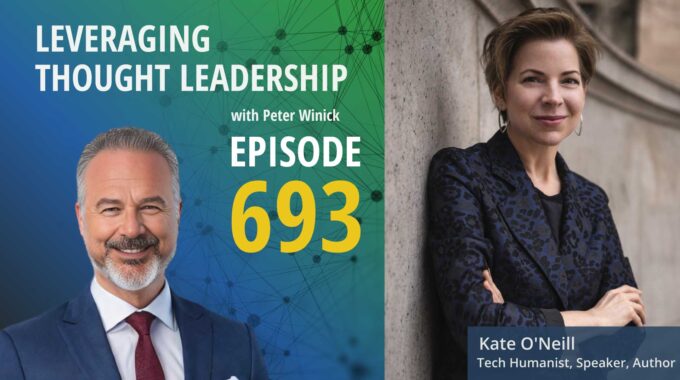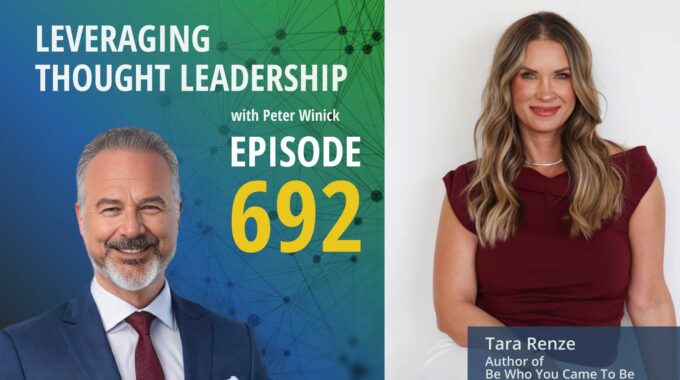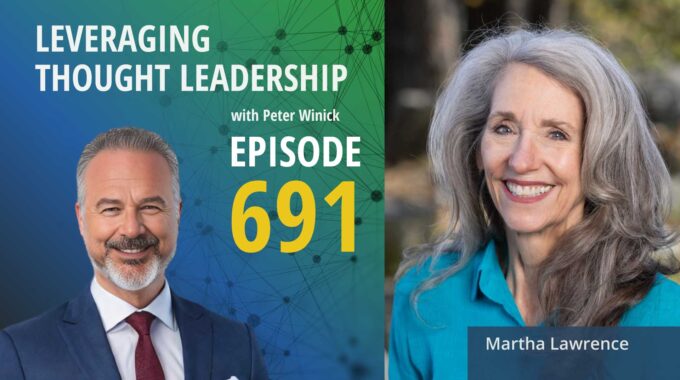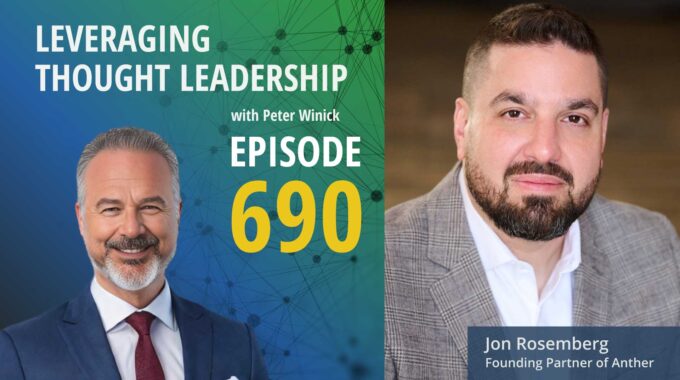Why speed without trust creates risk—and how executives fix it This episode focuses on how…
Value-Based Thought Leadership | Harry Kraemer
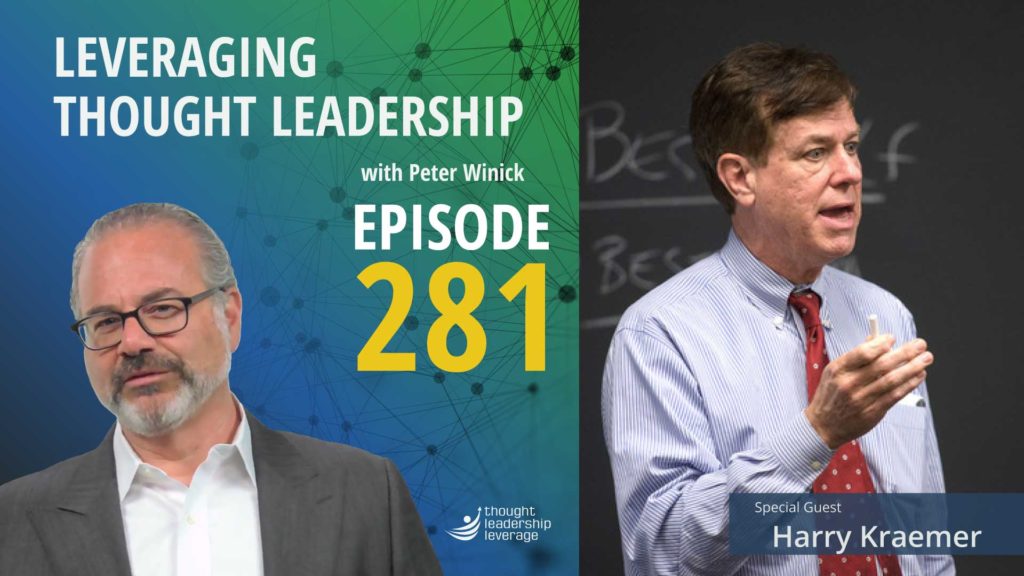
Using thought leadership to lead a value-based life.
An interview with Harry Kraemer about how the academic and business communities need each other and how leading value-based life can change the way you lead others.
Today’s guest is Harry Kraemer, a professor of management and strategy at Northwestern University’s Kellogg School of Management, where he teaches in the MBA and the Executive MBA programs. Previously, he was CEO of Baxter Healthcare. These two careers have given him a unique perspective on how academia and business work hand in hand.
Harry shares his journey from being a student at Northwestern to CEO, and back to Northwestern as a professor. In addition, we explore the somewhat strange origin of his first book Becoming the Best and how a student was the forcing mechanism that brought it to life.
Moreover, we discuss the trilogy of books (Becoming the Best, From Values to Action and Your 168) that Harry has written over the last ten years. He explains how the themes all tie together to help you become a value-based leader. Then, he gives advice about running a value-based organization while living a value-based life!
All of the profit from the sales of Harry’s books go to One Acre Fund, we highly encourage you to learn more about this incredible initiative.
Three Key Takeaways from the Interview:
- A thought leader can gain a lot from listening to the academic and business communities. Start by developing a perspective that understands both.
- Thought leaders need to know their values and their purpose if they want to understand how they affect the way you act and interact with people.
- Thought leaders must live their values even in the face of distraction and difficulty.
If you would like help developing content for your thought leadership, contact Thought Leadership Leverage. We can assist you with everything from book launch strategies, research, marketing, branding, sales, and more.
Peter Winick And welcome, welcome, welcome. This is Peter Winick. I’m the founder and CEO of Thought Leadership Leverage, and you’re joining me on the podcast, which is Leveraging Thought Leadership. Today I’ve got a guest that checks almost all of the boxes of the types of folks that we talk with. So Harry Kraemer, he’s the former CEO of a company called Baxter you may have heard of. He’s written two, maybe three books now. His latest book is Yours 168 Finding Purpose and Satisfaction in a Value Based Life. And he Can’t get out of school. He’s an academic at Kellogg at the School of Management at Northwestern. So normally, you know, we talk to people and say, you know, you come from business. Yes. You know, you’re you come from academia. Yes. Or you’re a published author. Yes. So congratulations on confusing our hashtagging system internally and being woefully overqualified to be on this talk with me today. So welcome aboard, Harry.
Harry Kraemer Nice to be with you, Peter. Nice to be with you.
Peter Winick So how the heck did this happen? How did you how do you go from, you know, cushy, great life as a CEO? You could have been kicking it back and golfing to academia. And then maybe there’s a side of masochism that says, I’m going to write a couple of books as well. Like, how did. Give us the story, Harry?
Harry Kraemer Yeah, So a little bit of serendipity here. Peter So I actually went to Northwestern, I would say it was a few years ago and my wife says, No, it was 40 years ago. And while I was there, the way I paid my way through, I graded all the finance papers for the finance faculty because as I mentioned out, I’ve been a major. So that paid for it so that what I was going to work. I got a job at Baxter International and I said goodbye. And the dean said, You know, you’re not going anywhere. Baxter’s in Chicago. I know where you are. So for 25 years, he would call me every two weeks and he’d say, I need you on a panel. I need to be a guest speaker. And I made the mistake of saying if it wasn’t for Kellogg, I wouldn’t have been the CEO of a $12 billion company. He said, I’ll never let you forget that. So I went there for two years, forgot to leave, and was there for 25 years and the last seven as the CEO, the day was announced I was stepping down as the CEO, Dean Jacobs said. Then 80 years old, the dean emeritus calls a day. I just heard it over the wire. You’re leaving Baxter? Thank God. I want you to teach. And I said, You don’t mean like I have a syllabus. Great papers. That’s not happening. Right. And he said, I think you did say you do whatever I told you to do. So you thought I was going to do finance. And I said, You got all these brilliant PhDs. I have an MBA. He said, What do you want to do? I said, I’d like to focus on leadership value and ethics. He said, That’s fine, but you better get a syllabus together because you start in two weeks. And so I’ve been doing this now for, I guess it’s 13 now.
Peter Winick Now, clearly, Harry, you could have said no.
Harry Kraemer You know, if you don’t really not, you know, don’t know. I’m going to show you how I can’t say no. A couple of people said when I was leaving Baxter, we love you to join our private equity firm. Sure. And he said, Well, I said, I’m going to teach you so you can get out of that. I said, You don’t know Dean Jacobs. I cannot get up. He was my he was my professors. So no.
Peter Winick Wow. I love that. So I’ll get. So give me give me a sense of sort of in my work dealing with authors and CEOs and thought leaders and such. Oftentimes there’s this tension or lack of understanding between the academic community and the business community. And what I mean by that is, you know, an academic will come out with an academically published paper, which is a polite way of saying a paper that nobody read, but they spent a lot of time writing.
Harry Kraemer You said that.
Peter Winick I did. Yeah, I said it. Yeah, yeah, yeah, I’m guilty. But you did shake your head. Yes. Even though you’re on audio, and I put you under the bus a little bit. So. So, you know, the academics have their way of communicating and doing things and everything’s got to line up to the 11th decimal. And they research and they study. That’s all fantastic. And then the business people go, Yeah, yeah, yeah, that’s great. But, you know, they wouldn’t know a customer if they fell in their lap or they wouldn’t know, you know, whatever, whatever. And the reality is it doesn’t have to be binary. So given that you’ve lived on both sides of the world, what could academics learn from business leaders? And what can business leaders learn from academics? Do you think you’re uniquely positioned to answer that?
Harry Kraemer Yeah, actually, Peter, it’s a it’s a great question because I actually think both are necessary. So the way I look at it is the way I think about it very honestly, is how academics bring, you know, the framework, the process, the intellectual rigor to it. But at the same time, particularly in the business school, a lot of these students come and say like, well, how do you be a CFO? How do you be a CEO? How do you lead people? So so in my mind, both are necessary. And I always really appreciated the academic side. But I thought to myself, hey, how do you how do you bring how do you bring both? So having one of these crazy characters who understands multiple perspectives, I thought, you know what? Both are pretty important. So when somebody says, which is important, I just say yes.
Peter Winick So there that multiple I’m going to push on that multiple perspective piece because yeah, I would think I don’t want to put words into your I think that could be, you know, your key to success as a CEO because so many people come at, you know, if we look at the CEOs sitting at the top there and the head of marketing saying X and the head of finance is saying why? And the head of it saying yes, and they all mean well and they all know well. But that ability to see from multiple perspectives where the marketing person might not even understand techno lingo and the finance person might not really understand the creativity of a marketing person, How is that applied and worked for you? And on the business side of the house?
Harry Kraemer I would. But Peter, I don’t know you that well. But that’s a phenomenal question. That is that’s the key to all of this. Right. And what I try to train people. Well, let’s just say you’re my finance guy. The question I would ask you is, do you want to be a great finance guy working for a company or one of the people helping to run the company who, among other things, knows a lot about finance? So in my mind, you truly want to understand multiple perspectives from multiple sides. And very few people do that because very few people, most people get very caught up in their way of thinking, that’s how you think, That’s how the up in it. If you can get your arms around it, I call it can you get from the roots to the trees to the forest, you have an enormous advantage. And as you know, Peter, very few people pull that off.
Peter Winick So I want to use as an example, lesser, so finance and more so there’s a lot of conversation in the art community around, I want to have a seat at the strategic table, I want to have a seat at the table. I wanted to see the table. And you know, from my view is you get the seat at the table. When you earn the seat at the table, no one’s going to wake up one day and say, Hey, hey, Fred, here’s a lovely seat at the strategic table and it looks like it would fit you. And I think that there’s this and again, I’m beating up on nature, but it’s very prevalent in that community where they’re really, really good at what they do and all the things that he needs to do. But to your point, are they really shepherds of the business? Are they really a strategic partner? Do they get the vision or are they sort of checking the boxes, protecting us, telling us the things we can and can’t do? So could you unpack.
Harry Kraemer That a bit? Well, I will. And in fact, what’s again, I love the analogy. So we’re sitting at the table, the person is there, the finance person. They’re the sales guys there. What happens? Well, usually the guy sitting there and he’s kind of doodling and all of a sudden somebody says, okay, that’s me, okay. Now I jump in because I’ve just been watching the movie up until that point. Okay. Yeah. This guy sitting there and somebody says, numbers, numbers, that’s me. As opposed to as opposed to Peter, the guy sitting there and the when the manufacturing guy saying something literally said, well, let me think about that. You know, I’ve been studying this. Why do we have multiple plants in Europe? Why don’t we just have one larger point? Why don’t we? Because you are a business, as I say. Do you want to be an HR. Person working for the company or do you want to be one of the people running the company who happens to know a lot about people? They are two very, very different people.
Peter Winick No, and i and i love that that way that you unpack that. So I want to pivot for a moment to the third. Check the box for Harry. So we’ve got CEO, we’ve got academic. And then as if that wasn’t enough, you’re going to go for published author, are you gold medal winner or Nobel Prize winner as well.
Harry Kraemer And that’s all I do is write and go, okay, yeah.
Peter Winick So, so let’s go back to your first book. What? Why did you choose to write a book? And then. How has that publishing landscape changed over the years? Now that you’re on your third book, I believe.
Harry Kraemer Yeah. So first of all, what you asked me whether I decide to write the first book. I did not decide to write the book. In fact, I decided, is.
Peter Winick This the dean again? Did the dean know this?
Harry Kraemer Is this. This is. This is this is a fellow this is a student by the name of Samir, who literally, in taking my class at Kellogg, said, you need to write a book. And I explained, I don’t even write short, short email, so I’m not writing a book. And he kept pushing me. Don’t take away when I used to have 55,000 people at Baxter that I couldn’t get a nice way, said, This is what we’re doing now. I have this 26 year olds telling me what to do. And I said, You know, I’m not writing a book. So after the fourth or fifth time, he literally came into my office and said, Can I take your class again? And I said, Samir, are you slow? I mean, you took the point beat. And he said, No, no, no. He said, I’m going to audiotape the entire course. And if you don’t really decide to write a book, I’m just going to self-publish and print it all. Now, having five kids, Peter I’m used to people having a lot of excitement for a couple weeks till he shows up all classes, records, everything, and shows up in my office with 250 double spaced pages of an oral scription of my of my first class, which, you know, you don’t realize how bad of a speaker you are until you read a deposition. And so I thought, well.
Peter Winick Well, but the written word is very different than the spoken word. I mean, it’s.
Harry Kraemer What I do where we call. Yeah, right. Where were you, Peter, ten years ago when this happened? So this will be great. You know, I’ve got. I got 250 pages. I’ll sit down at the kitchen table. Six weeks later, I had one chapter, 12 pages. I’m averaging two pages a week. And I said, you know what? I’ll put it in my top drawer and I’ll deal with this. When I’m 80 years old, I’m in a nursing home, and then I will call the set. Where are you? Where are the where’s the book? And I said to me, he goes, look, he said, I got you a I got you an agent. We’re getting tired of waiting around. Okay. And then meanwhile, we contact Wiley and said we’d like to sign a contract, and ten months later we have the first book.
Peter Winick I love it. So if you’re enjoying this episode of Leveraging Thought Leadership, please make sure to subscribe. If you’d like to help spread the word about our podcast, please leave us a review and share it with your friends. We’re available on Apple Podcasts and on all major listening apps as well as at ThoughtLeadershipLeverage.com/podcasts.
Peter Winick Tell me a couple things you learned about that, because we talk about obviously the spoken word versus the written word. You know, oftentimes, I mean, transcription is a good way to sort of capture the essence. But it is not a, you know, run it through a piece of software and voila comes a book because you read it and go, my God, that was a seven-page run on sentence.
Harry Kraemer Or Yeah, well, I did get lucky to a certain degree, Peter, because it took a lot of thought, a lot of to get it, to get it into written form. But there’s still some semblance of the fact that’s how it started off. Because now when I meet former students at the airport, they’ll say, I got a hold of your first book for values to actually see what you think. Is it, You know, in a strange way, it feels a little bit like you talking. Well, it was.
Peter Winick Really funny you should say that. Yeah, right, right, right. So you must have enjoyed it enough. Or again, the theme here maybe can’t say no enough to then do it again and again. So why did you write the next two books and what did you maybe differently or how did you approach this?
Harry Kraemer Well, you know, it’s funny, Peter, and this is one of the sides that I love about academia. Most of the ideas I get are from the students, really through a lot of the questions. So the first book, the first book, as you may know, was literally all about no kidding around. How do you become a value? Basically, How do you do That was the first book. Well, then after a couple of years and after having given 3 or 400 talks, people started to say, I get it. I get it. That’s how you’re a value based leader. But how do you lead a value based organization? How does that happen? And I thought, you know, okay, that’s going to be my next course. And I focused on that. And then I said, here’s how your value based leader. Here’s how about a value based organization? I’m done. And the conclusion of all this last chapter, no pun intended, was about 11 months ago, because I’ve done so many these talks and all the proceeds go to this organization in Africa. They called and said, what are people asking now? And I said, Interestingly enough, the major thing executives seem to be asking is, that’s great, but how do you live a value based life?
Peter Winick How do you live? Yes, I love that. Because that’s a more if you I mean, there’s a lot of reasons underneath that. The millennials are Gen Y is more integrated holistic approach where, yeah, you don’t want to be a value based leader if you’re a jerk at home or a jerk in the community. And it’s and it’s no longer, you know, the borders are pretty permeable now between work and home. Now there’s no borders between, you know, you know, it’s 17 steps from the office to the kitchen, you know, which is about so interesting. So it’s sort of a almost a trilogy, if you will.
Harry Kraemer Right. You know what? It’s funny, Peter. That’s exactly what happened, because I thought, okay, well, how do you want to value base life? I said, sounds like a great idea. Give me a couple of years of work. And I said, No, no, no, no. We need we need a book by June. I said, I don’t think that’s possible. It will be. Because here’s the deal. If you if you finish and get the manuscript to us by June 1st, we’ll make another very, very large contribution to the one acre fund in Africa. So that’s fine. And so it’s funny, but I literally think of it, you’re the first person who said to Peter, it literally is like a trilogy. Here’s how you lead yourself. Here’s how you lead people. Now, how do you live about? How do you live a value based life? How do you take what’s important to you, your career, your family, your spirituality? Maybe your health have a little fun realizing you’re here for a blink of an eye. Do you have a moral responsibility to make the world a better place? And so and.
Peter Winick Those things need to be aligned. It’s interesting because I take my clients through an activity that we do when we’re working on strategy where they’re fairly clear at this point, not crystal clear, but fairly clear around what they’re what the essence of their content is and all that is. Okay, great. So you’re in the agility world or resilience or creativity and a bit whatever it is. Let’s get let’s get real now and say, okay, as a result of some intervention with you, some exposure to you, it could be in the form of a book or a program or whatever it is. What is the outcome at an individual level, at a team level and an organizational level? The individual level is usually fairly easy. So people will, you know, if this is negotiation skills, something, people will be a bit better, negotiators or communicators, whatever it is, it’s when you get to the team in the order level, you know, you’ve got to answer those questions and then you have to say, what’s the benefit to the organization of having a being this type of organization? What’s the ROI, what’s the impact, how they differentiate in the marketplace? How is it beneficial to their customers? It’s, you know, client retention, talent attraction. So it’s interesting that you sort of answered that riddle inevitably, sort of somewhat backwards, right? You start started sort of big look. Yeah, yeah, absolutely.
Harry Kraemer Yeah. No.
Peter Winick I haven’t read all three. But are those are those books aligned?
Harry Kraemer I’d say they’re incredibly well aligned. Okay. And it’s basically become the classes that I teach at Northwestern Kellogg APT. Absolutely. Totally aligned.
Peter Winick And would you given that I mean, now you’re in a different position. You have all three books. If somebody was starting down this journey, would you recommend they start with the latest book or the oldest book? Do they start at the individual level? Like, where would you go?
Harry Kraemer I just think that the journey, you know, to get perfect, I would definitely start with the what, The third book. I’m interested in literally the whole idea of, guess what? If you’re going to live a value based life. First of all, what are your values? What’s your purpose? What matters? You know, look, no kidding around. What kind of a person do you want to be and how do you decide to make decisions and how do you take the 168, the number of hours in a week? How do you truly think about that? And is that aligned with your values and your beliefs or not? And sort of the basic idea, Peter, is how can you possibly lead others if you can’t figure out how to lead yourself? So that whole.
Peter Winick And I love that because most of the energy and effort, particularly at a school like Kellogg, is really spent on the skill side. Right. Cash flow and projections and case studies and strategy and all those things are critical, but they’re also somewhat of a commodity and could be, you could argue, irrelevant if you don’t have the other piece nailed, which is and they’re not teaching it in every business school what you’re teaching.
Harry Kraemer Yeah. No, it’s become a hallmark of, I think, what we do at Kellogg. You’re absolutely right. And I was telling students all the mechanical things, you know, you need to turn out, you need to do them. But I would almost argue with you, if you truly want to make a difference in the world. Crazy analogy I use If you if you go to Great America, to the amusement park when cash flow is to get in the door. But whether you’re in the door looking at the popcorn stand or you’re running great America, I think, has a lot to do with. Do you have, as you would know, not only IQ, but what’s your IQ? What is what is your what is your ability to relate and influence people? Because at the end of the day, that’s what it’s all about.
Peter Winick So if I were to say to you, Harry, hey, here’s a magic pill, let’s hang up and talk in a year and all your dreams come true or, you know, are your goals are met as it relates to the new book and the thinking and maybe not just the new book, but all sort of all of your thinking as you put it out of catalog, What would that be?
Harry Kraemer So it’s a year later. We’re older, we’re hopeful and know I think I think it’s only a year later, chief, and I probably will hopefully do another, you know, three, 400 talks that every person that I can have some influence on and maybe increase the number of people that have a value based approach to their life, that that in my mind, is a win. You know, I feel like I’m here for a blink of an eye. And I told the dean at 65 that my goal health wise, if I can teach a killer the next 20 years to 185 and make a small, small impact on values, particularly the world we’re living in now, where I won’t get into what if, what if I thought this was important 15 years ago, I would say it’s astronomically more important given the crazy world we’re living in today.
Peter Winick So in my vernacular, I would put that in the sort of evangelical bucket. The part of the reason you’re on the planet is to get this message out there. And it’s not about the money and it’s not about the ego and it’s not about I mean, you’re sort of a service to the message. Yeah.
Harry Kraemer Right. There’s nothing to it. 100%. All the speaker face, all the talk, everything, the books, everything goes all the way to fighting for me. It’s fantastic. You could have your listeners just look up to Peter one-acre fun.org who has an amazing story.
Peter Winick Amazing. Well this has been fantastic. I appreciate you sharing with us and coming on board today and telling us your story and I wish you all the best. Thanks, Harry.
Harry Kraemer Thanks, Peter. Great to be with you. Great to be with you.
Peter Winick To learn more about Thought Leadership Leverage, please visit our website at ThoughtLeadershipLeverage.com. To reach me directly. Feel free to email me at Peter at Thought Leadership Leverage dot com. And please subscribe to Leveraging Thought Leadership on iTunes or your favorite podcast app to get your weekly episode automatically.


